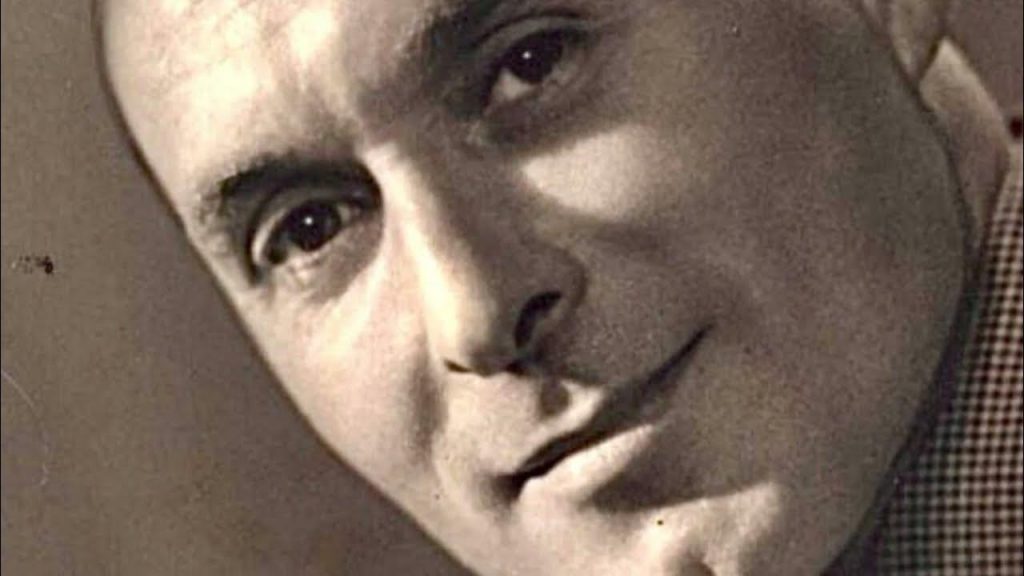Maximiano de Sousa (Sé, Funchal, February 2, 1918 – Algueirão-Mem Martins, Sintra, May 29, 1980), known by the stage name Max, was a Portuguese singer and fado singer.
He was one of the most popular stars of Portuguese radio, theater, and television from the 1940s until his death in 1980. He was responsible for hits like “Noites da Madeira” (Madeira Nights), “Bailinho da Madeira” (Madeira Dance), “A Mula da Cooperativa” (The Cooperative’s Mule), “Tingo Lingo Lingo”, and “Bate O Pé” (Tap Your Foot). Nothing would have predicted that this young man from Madeira, who dreamed of being a barber and had been a tailor, would become one of the most popular Portuguese artists.
Maximiano de Sousa, known to all as Max, was a Madeiran born on February 2, 1918, at number 7 Rua dos Tanoeiros, Sé parish, in Funchal, as the illegitimate son of an unknown father and Georgina de Sousa, a single, 25-year-old domestic worker, also from Sé parish in Funchal. He was born in poverty, which is evident from the mention in his birth record that his mother did not have to pay registration fees due to being indigent.
It was in Madeira that he began his artistic career. He had dreamed of being a barber and violinist, had a musical ear but little patience for learning music theory, and ended up learning the tailor’s trade. However, his lifelong passion for music led him to debut in 1927 at Praia Oriental in Funchal and eventually turned into a career in 1936 when he started performing at a hotel bar in Funchal: singing at night and tailoring by day.
In 1942, he was one of the founders – as a singer and drummer – of the Toni Amaral Ensemble, which became a sensation in the Madeiran nightlife and later conquered Lisbon in 1946. The workload was heavy, and the ensemble settled at the Nina nightclub, performing the rhythms of the moment – boleros, slow dances, and fado songs. On July 9, 1942, he married Luciana de Freitas, a domestic worker (Sé, Funchal, May 31, 1919 – Pena, Lisbon, December 29, 1990), the illegitimate daughter of an unknown father and Carlota de Freitas, from Santo António da Serra, Machico, at the São Pedro church in Funchal.
It’s the Fado Mayerúe by Armandinho and Linhares Barbosa, better known as Não Digas Mal Dela (Don’t Speak Badly of Her), that popularizes Max’s voice and leads to his departure from the Toni Amaral Ensemble, finally starting the solo career he desired in 1948.
Now performing solo, Max shoots to stardom through radio and his appearances on the Passatempo APA of the Portuguese Radio Club, in partnership with Humberto Madeira. In 1949, he signs a contract with Valentim de Carvalho and records his first album: a 78 rpm record with Noites da Madeira (Madeira Nights) and Bailinho da Madeira (Madeira Dance).
It’s the first of a long list of hits like A Mula da Cooperativa (The Cooperative’s Mule), Porto Santo, 31, and Sinal da Cruz (Sign of the Cross). In an interview with the Se7e magazine in 1978, he mentioned that it was the records that brought him the most money, as “the royalties were always rolling in”.
After radio, Max conquers the theater, participating at the invitation of Eugénio Salvador in the revue Saias Curtas (Short Skirts) in 1952. It will be just the first of a long series of revues that will also confirm his talents as an actor and comedian.
In 1957, he leaves for the US for a five-year tour, interrupted after two years due to a sudden heart condition. He then traveled to Angola, Mozambique, South Africa, Brazil, and Argentina.
After returning to Portugal, although he remains one of the most beloved artists of the public, he will find some difficulty in finding work, surviving on the records he continued to record. One of his biggest hits will emerge during this period, Pomba Branca (White Dove).
He died on May 29, 1980, in the parish of Algueirão-Mem Martins, Sintra municipality.
On July 13, 1981, he was posthumously awarded the rank of Officer of the Order of Saint James of the Sword.
In 1991, a bust in his honor, created by sculptor Luíza Clode, was inaugurated near the Largo do Corpo Santo.





